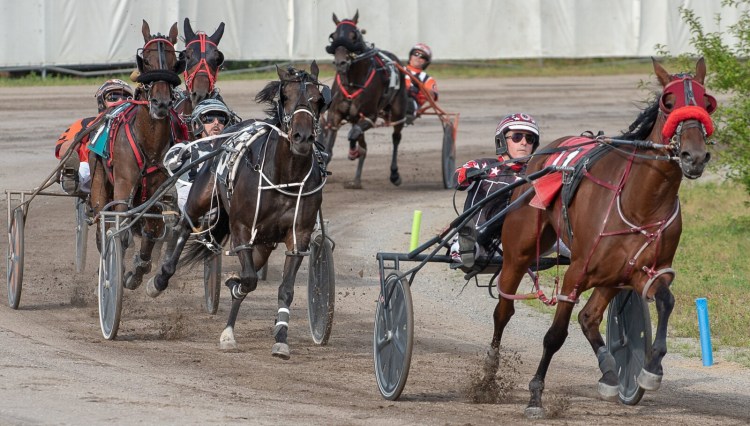TOPSHAM — Harness racing at the Topsham Fair hit the chopping block earlier this year because the fair was losing money on the sport, according to fair officials, who said the tradition has been kept alive due to the work of volunteers.
“We lost money with it, but it’s an attraction,” Topsham Fair Association President Leon Brillant said last week. “That’s why the fair is keeping it. We hope it will pick up for us.”
Brillant declined to give fair expenditures or revenues, including for harness racing. Last week, he said the fair association’s board members wouldn’t release information about finances out of fear of attracting criminal activity.
The Topsham Fair is the smallest in the state to host harness racing. As a result, the cost to put on the races is more of a burden, according to Marilyn Hunter, the fair’s superintendent of entertainment and marketing.
The fair doesn’t have to pay out prize money, but it must cover some costs, including judging, the starting gate truck and the electronic sign that displays race information.
‘CLEARLY CONFUSION’
Harness racing officials disagree that harness racing is losing more than it’s making.
Henry Jennings, executive director of the Maine Harness Racing Commission, said many other fairs consider harness racing to be another form of entertainment that draws more patrons.
“There’s clearly confusion about all of the revenue sources and not all of it was being considered,” Jennings stated in an email, referring specifically to the Topsham Fair. “It looks like they have been losing money, but they don’t consider increased gate fees and increased concession revenue as part of their calculations.”
Agricultural fairs generated more than half of the total annual racing wagers in 2016, according to a study by the Maine Center for Business and Economic Research at the University of Southern Maine. Tourists visiting Maine fairs and attending races generated an estimated $7.5 million.
The Topsham Fair receives an $11,627 annual facility stipend for hosting harness racing, according to Jennings. It also receives a small wagering income and $1,600 per day from the Horseman’s Association. The state also covers the purses to pay the winners.
Jennings states that the facility stipend and wagering revenue has been dropping gradually over the last decade, though it increased slightly last year statewide.
“There are a series of efforts underway for 2019 aimed at reducing costs, so hopefully 2019 marks a turning point,” Jennings said.
PEAKS AND VALLEYS
Across the country, more than 200 fairs in 22 states host harness racing events. In Maine, eight of its 25 agricultural fairs feature racing this year. Topsham has five days of racing, with the final day set to kick off at 1 p.m. Saturday.
A group of volunteers stepped up this year to help run the harness racing and cut the costs at the Topsham Fair. They have been at the fairgrounds every weekend for weeks, getting the venue ready for the races. The goal is to get the cost of the racing down to $15,000, according to volunteer Craig Coffin.
Fred Ward, 63, of Brunswick, is the assistant director of racing at Topsham Fair, as well as a horse owner, driver and trainer. Without harness racing, he said he’d have to go back to digging clams after 35 years in the racing industry. He has five horses he races and a broodmare who made $250,000 while racing for him for a decade.
Everything he owns centers around horses. He doesn’t expect losing harness racing at the Topsham Fair would hurt his livelihood, but he and others are putting in many hours to make the sport successful.
Ward said when betting was legalized in the 1930s, it saved the financially strapped fairs. A stipend account was established, and a certain percentage of every harness-racing wager went into the fund. It continues to support fairs, including those that discontinued harness racing.
With the creation of state lotteries and casinos, gamers no longer had to wait for the agricultural fairs to legally gamble, Ward said. Interest waned. Oxford County Fair discontinued harness racing after Oxford Casino Hotel opened in 2012.
Mike Cushing, president of the Maine Harness Horseman’s Association, is a third-generation horseman and has dedicated most of his adult life to keeping harness racing alive.
“You need something during the day for activity” at agricultural fairs, Cushing said. “Vehicles, people, foot traffic — harness racing brings that.”
According to the 2016 study on the Maine harness racing industry, there was $29.6 million in revenue that year. The industry supported a total of 1,026 full-time, part-time and temporary jobs and generated $27 million in personal income in Maine in 2016.
“This industry has had peaks and valleys,” Cushing said. “Over the last two years, almost at every statistic, we’re trending forward. Nowhere near where I want to be, nowhere near where we’re satisfied, nowhere near where we feel complacent or stable, but I think we’ve found bottom.”
Send questions/comments to the editors.



Success. Please wait for the page to reload. If the page does not reload within 5 seconds, please refresh the page.
Enter your email and password to access comments.
Hi, to comment on stories you must . This profile is in addition to your subscription and website login.
Already have a commenting profile? .
Invalid username/password.
Please check your email to confirm and complete your registration.
Only subscribers are eligible to post comments. Please subscribe or login first for digital access. Here’s why.
Use the form below to reset your password. When you've submitted your account email, we will send an email with a reset code.